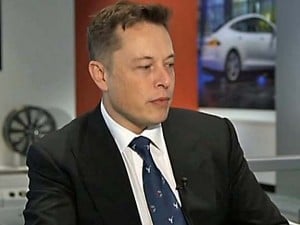
It’s been win-some-lose-some for Tesla as it pushes to reshape the automotive landscape with a marketing strategy based on factory-owned showrooms. But it now appears that the California-based battery-carmaker might be considering a revised strategy that would include at least some franchised dealers in its distribution mix.
That could permit Tesla to crack into states, such as Michigan and Texas, which have firmly ruled against Tesla’s current approach. It might also permit the maker to expand its coverage even in states, such as New Jersey and Nevada, which have okayed the factory-owned approach.

“We may need a hybrid system, with a combination of our own stores and some dealer franchises,” Tesla Founder and CEO Elon Musk acknowledged during an interview with John McElroy on Autoline Daily.
(Tesla announces all-wheel-drive, performance and “auto-pilot” technologies. Click Here for more.)
Exactly how Musk now envisions the Tesla distribution system remains to be seen, but he has been an active proponent of change in an industry that has long and zealously guarded the traditional franchise system. Over the years, makers including Ford Motor Co. have tried to push through changes, including the use of factory-owned showrooms and Internet sales. So far, such moves have gained little headway.
While the Internet has become a central element in the automotive purchase process for most American motorists, buyers still need to go to showrooms to complete the deal and pick up their vehicles. About the biggest change to have occurred in recent decades has been the growing role of corporate-owned dealership chains – mega-investor Warren Buffett just purchasing the huge Van Tuyl Group this past month.
But Tesla has been doggedly pursuing its goal of owning all of its own showrooms. It gained unexpected support in a statement from the Federal Trade Commission. But it has faced a rockier road as it has tried to roll out that strategy on a state-by-state basis. Dealers have traditionally banded together as one of the toughest lobbying forces in the U.S., and they’ve been able to thwart Tesla’s campaign in a number of states, notably Texas.
Ironically, insiders contend that the Lone Star State’s reluctance to revise its franchise rules led Tesla to settle with neighboring Nevada as the site for the maker’s Gigafactory battery plant. Better known for its gambling and legal brothels, Nevada not only agreed to provide Tesla a $1.25 billion incentive package but also to approve its factory stores.
The question, posed during his interview with Musk by Autoline host McElroy, is whether Tesla had the resources to handle distribution as it grows from a company selling a couple thousand vehicles a month to one moving that much metal in a week.
“Musk admitted that relying exclusively on company stores probably was not enough,” McElroy noted.
Separately, HybridCars.com said it has been told Jim Chen, Tesla’s legislative director, also has suggested the carmaker would need independent retailers as it grew.
(Auto dealer lobbying group rejects plan to lower interest rates for minority buyers. Click Here to find out why.)
When it might make the switch is uncertain. Considering it has run into a stone wall in Texas and several other states where demand for battery-cars like the Model S could be significant, Tesla might need to switch strategies soon.
On the other hand, bringing in franchised dealers now could be seen as a sign of weakness. Sources who spoke to TheDetroitBureau.com suggested Tesla might wait until closer to the launch of its Model III, expected sometime around 2017. That will be the maker’s attempt to target a higher-volume niche, bringing the price of its battery technology down to a starting point as low as $30,000.
At that point, Tesla might simply not be able to set up and operate enough factory-owned stores to meet anticipated demand without help.
If Musk has a clear idea in mind he isn’t yet saying. But the South African-born entrepreneur is known to speak his mind quite openly, whether on-air or in tweets and blog posts, so he could reveal a bigger part of the picture in the near future.
(A battle of the super-premium cars is brewing as Caddy preps new CT8, Audi its A9. Click Here for more.)








GM dealers who use the Shop-Click-Drive online shopping tool (~1,600 at this time) can actually make it possible for consumers to complete the entire shopping/buying/trade-in/financing transaction totally online without a visit to a dealership. However, most consumers do still choose to visit the dealership at some point in the process. More than 11,000 new vehicles have been sold using Shop-Click-Drive to date.
I wish Shop Click Drive had a feature to look for a vehicle in the collected dealers’ inventory rather than having to look at each dealer individually for a specific vehicle.
If Tesla is going to scale up, they will have to address service issues differently than shipping every broken car to California, and once the Tesla novelty wears off people will be more interested in cross-shopping. Right now Tesla can get away with a take-it-or-leave-it approach to customers.